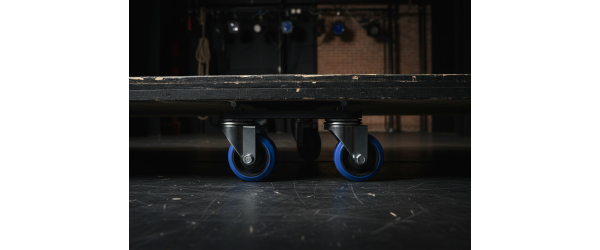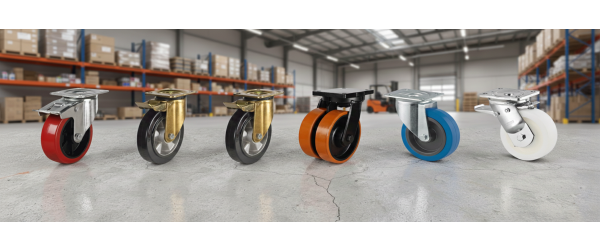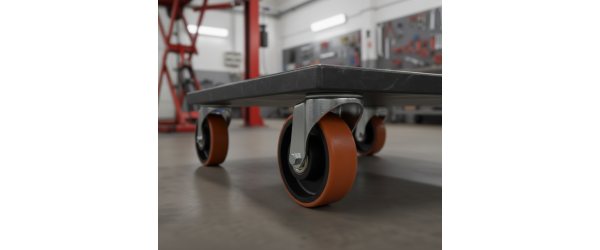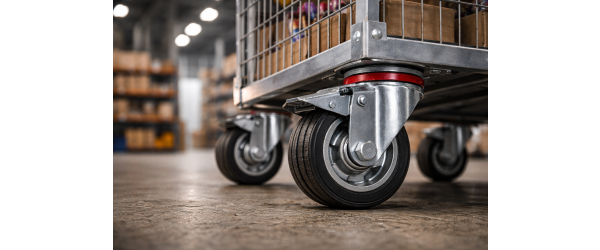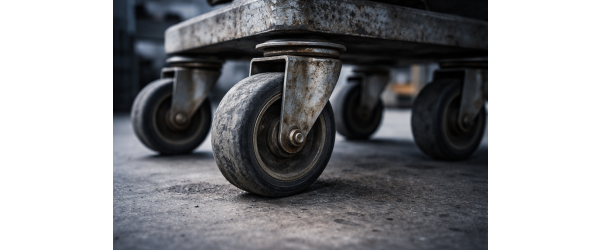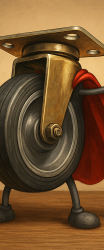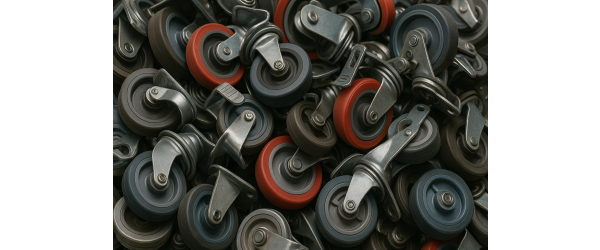Castor wheels are used in countless industries and settings, from hospitals and warehouses to schools and offices. They play a vital role in mobility, safety, and efficiency. Despite being such an essential component, castors are often misunderstood. Many myths surround how they work, what they are capable of, and where they should be used.
At Castors Online, we believe that the right knowledge helps people make the best choices for their equipment. In this blog, we will address some of the most common myths about castors and set the record straight.
Myth 1: All Castors Are the Same
One of the biggest misconceptions is that all castors perform in the same way. In reality, castors are designed for specific applications and environments. A light-duty furniture castor is very different from a heavy-duty industrial castor.
Different castors vary in size, material, load capacity, and mobility. For example, nylon wheels are tough and hard-wearing for industrial floors, while rubber wheels protect delicate flooring in offices or homes. Choosing the right castor makes a huge difference in both performance and safety.
The truth: Castors are highly specialised, and the right choice depends on the environment, floor surface, and load requirements.
Myth 2: Bigger Wheels Always Mean Better Performance
It might seem logical to assume that larger wheels automatically perform better. While larger wheels can handle certain surfaces more easily, they are not always the best solution.
The performance of a castor depends on multiple factors including the material of the wheel, the type of bearing, and the load it is designed to carry. For example, a smaller polyurethane wheel with a precision bearing might roll more smoothly than a larger wheel made from a harder plastic.
The truth: Bigger is not always better. The right wheel size should match the application, floor surface, and required manoeuvrability.
Myth 3: Castors Damage Floors
Another common belief is that castors inevitably damage floors. This misconception likely comes from older or poorly designed wheels that left marks on wooden or vinyl surfaces.
Modern castors are designed with floor protection in mind. Soft rubber, polyurethane, or elastic rubber wheels are created specifically to roll smoothly without scratching or denting floors. In industrial settings, nylon wheels provide strength without unnecessary wear to concrete or resin-coated floors.
The truth: Choosing the correct wheel material prevents floor damage and can even extend the life of your flooring.
Myth 4: Castors Are Only for Industrial Use
Many people assume that castors are mainly used in factories, warehouses, or heavy-duty workplaces. While castors are essential in these environments, they are equally important in everyday spaces.
Offices use castors on chairs and storage units. Schools use them on mobile desks and science lab equipment. Hospitals rely on them for beds, trolleys, and medical devices. Even at home, castors are used for furniture, storage boxes, and DIY projects.
The truth: Castors are everywhere, from domestic use to industrial applications, making mobility possible in almost every environment.
Myth 5: Swivel Castors Are Hard to Control
Some people believe swivel castors are difficult to manoeuvre compared to fixed wheels. While it is true that swivel castors move in multiple directions, they are not inherently harder to control. In fact, they provide greater flexibility in tight spaces.
Many systems use a combination of fixed and swivel castors to balance stability and mobility. Adding a brake to swivel castors also gives additional control when you need equipment to stay in place.
The truth: Swivel castors provide excellent manoeuvrability, especially when combined with fixed castors and locking mechanisms.
Myth 6: Castors Do Not Carry Heavy Loads
Another misconception is that castors are not suitable for heavy-duty applications. This could not be further from the truth. Industrial castors are specifically engineered to handle loads weighing hundreds or even thousands of kilograms.
The key is choosing castors with the correct load rating and ensuring they are used in the right quantities. For example, a single castor might be rated for 300kg, but a trolley with four of these castors can carry far more.
The truth: Heavy-duty castors are designed to carry substantial loads safely and efficiently.
Myth 7: Castors Wear Out Quickly
Some assume castors need replacing regularly because they wear out fast. While poor-quality castors may fail prematurely, well-designed castors made from durable materials can last for years, even under demanding conditions.
Maintenance also plays an important role. Regularly checking for debris, lubricating bearings, and ensuring castors are used correctly will extend their lifespan significantly.
The truth: High-quality castors are built to last and will provide years of service if maintained properly.
Myth 8: Castors Are Noisy
Older castors or those used in unsuitable environments may create noise, but modern designs have solved this issue. Rubber or polyurethane wheels provide quiet rolling, which is especially valuable in hospitals, offices, and libraries. Precision bearings also reduce vibration and noise during use.
The truth: With the right choice of wheel material and design, castors can roll smoothly and quietly.
Final Thoughts
Castors are an essential yet often misunderstood component in both domestic and industrial environments. By clearing up common myths, it is easier to see how valuable they are for mobility, safety, and efficiency.
At Castors Online, we provide a wide range of castors tailored to different applications, whether you need heavy-duty wheels for a warehouse, soft castors for office furniture, or versatile solutions for home storage. With the right castors in place, you can ensure long-lasting performance and a more accessible, user-friendly environment.
If you are looking to upgrade or replace your castors, explore our collection today and discover the difference the right wheels can make.

